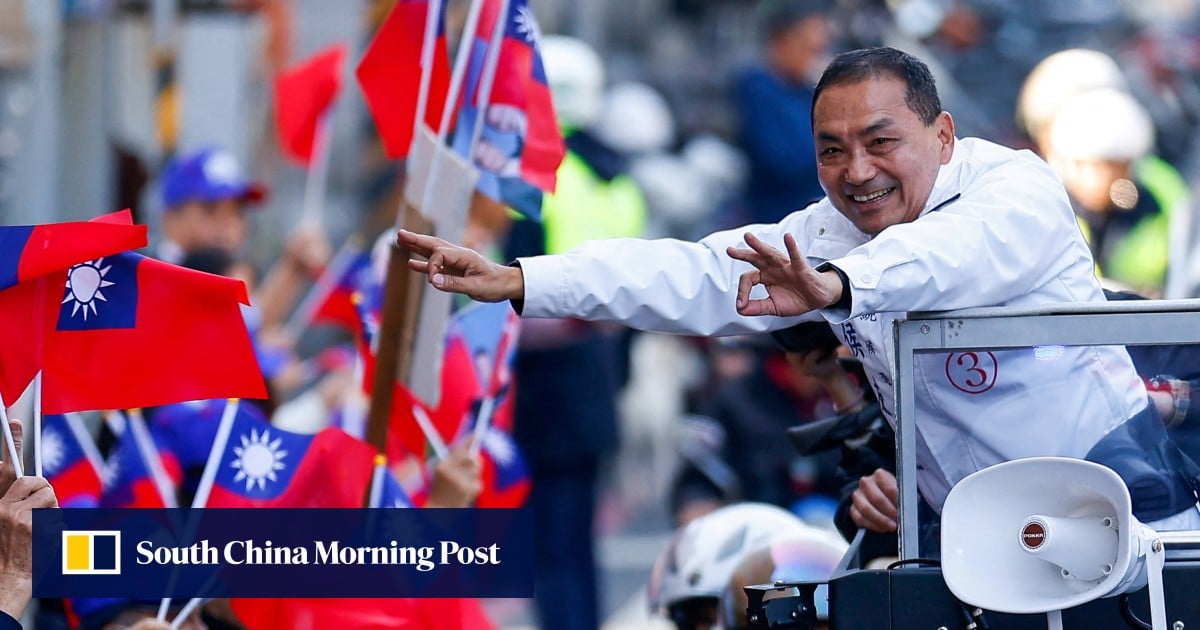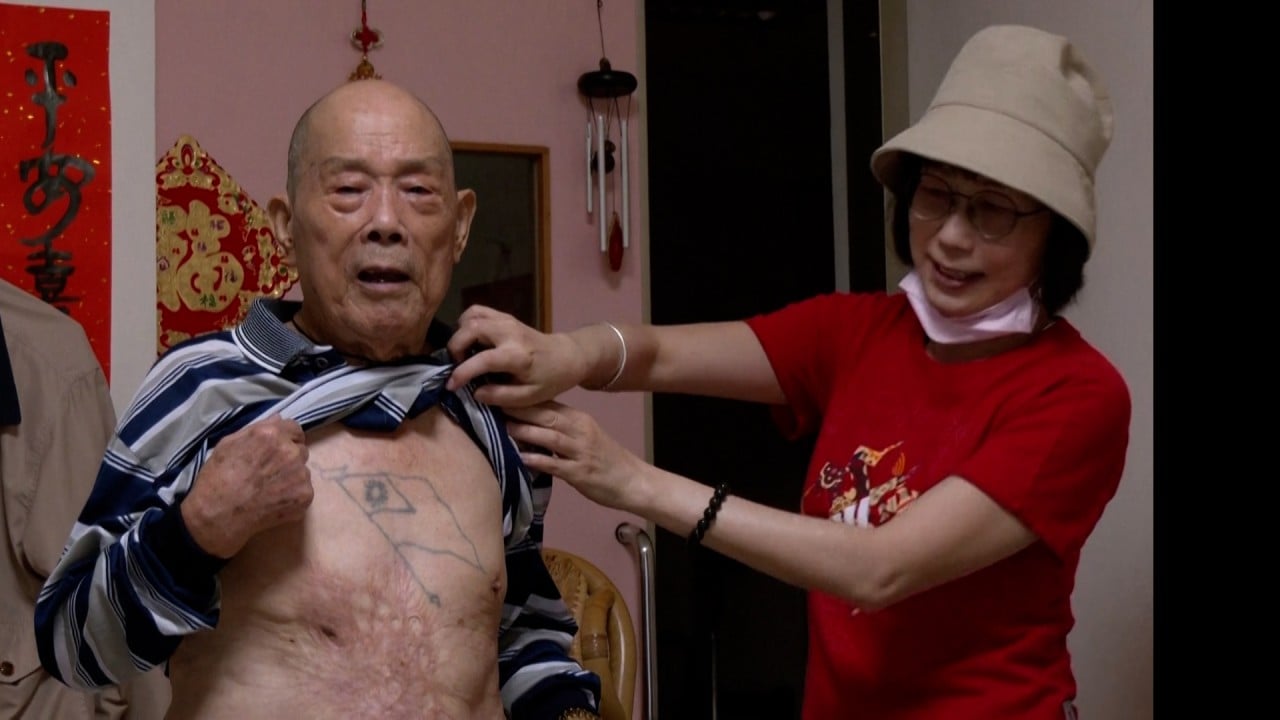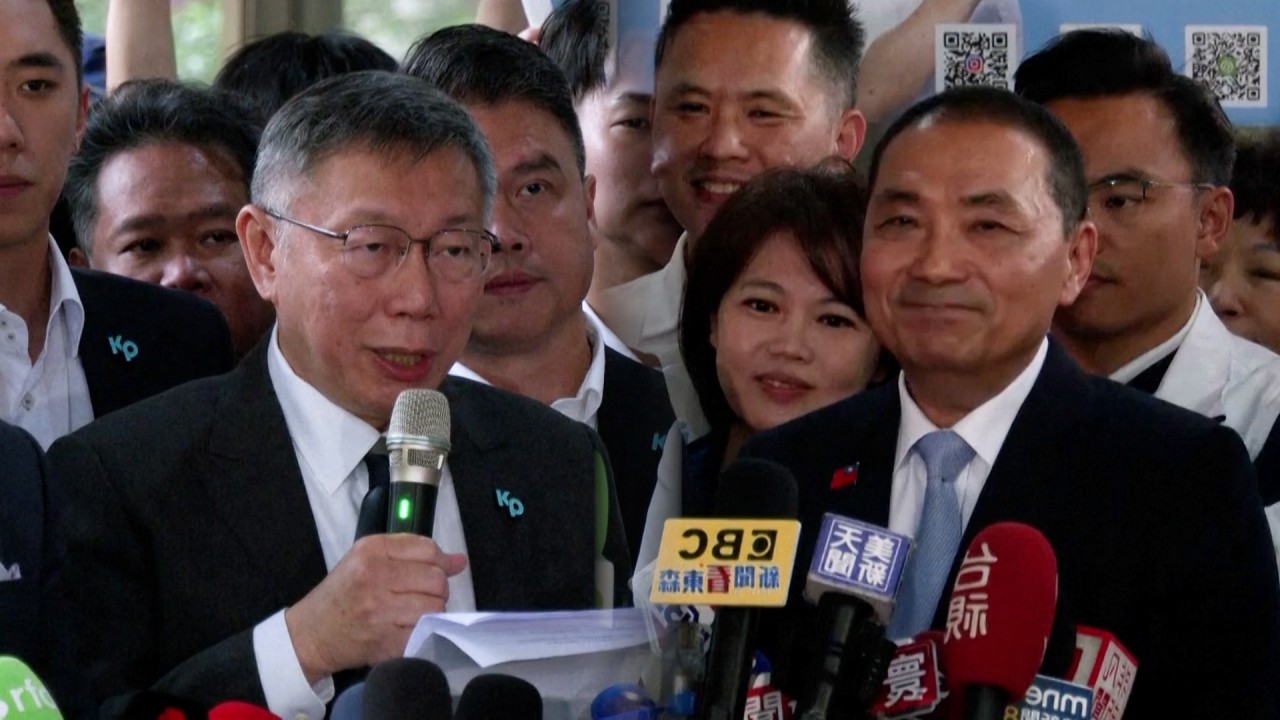The middle way
Hou’s “middle way” vision for Taiwan, which was intended to describe his style of governance, has instead resulted in him being seen as lacking charisma, political analysts said.
“Hou’s image and performance have been consistent throughout the campaign. He is still the same guy, not very eloquent in his speech, and does not fit in the type of a strong charismatic presidential image,” said Chang Chun-hao, a political scientist at Taipei’s Tunghai University.
Hou began to draw attention as a potential KMT presidential candidate after his 2022 landslide re-election as mayor of the city of New Taipei, which sits across a river from Taipei.
Who is running in Taiwan’s presidential race and what does it mean for Beijing?
Who is running in Taiwan’s presidential race and what does it mean for Beijing?
Previously, Hou served as a law enforcement officer for more than 30 years. In 2012, he was appointed as vice-city mayor of New Taipei by Eric Chu Li-luan, the KMT’s current chairman, who was mayor at the time.
Throughout his campaign, the 65-year-old has often told a story about his childhood in Chiayi, a county on the west coast where he spent time on a pig farm that his father worked at. At 19, Hou left home for the capital Taipei and climbed the ladder as a police officer, eventually leading the National Police Agency from 2006 to 2008.
But before that, Hou had already become a household name when he rescued the family of a South African diplomat in a high-profile hostage case in 1997, earning himself a reputation for being both “tender” and “tough”.
Hou’s campaign team has attempted to leverage this image. A biography entitled “Brave and Fearless” was published during the campaign in November.
During campaign rallies and televised speeches, Hou has made a point of playing up his local roots by speaking his Hokkien language, a dialect that his family has used since long before the KMT arrived on the island in 1949.
The decision to communicate in his native language, which is spoken by one-third of Taiwanese, was a tactic to help consolidate support from older people and swing voters, according to a KMT campaign worker.
In terms of his domestic policies, Hou has emphasised fighting crime and opposing efforts to abolish the death penalty, even promising to execute inmates on death row. The tough-on-crime messaging has been an effort to connect with more conservative voters, while slamming the ruling DPP for “deliberately not carrying out penalties”.
But Hou’s record in law enforcement has also attracted controversy. In 1989, Hou led the police attempting to arrest the Taiwanese pro-democracy activist Nylon Cheng, who died after setting himself on fire during the incident.
When asked by reporters about the police action, Hou, who has been criticised for his hardline approach, said: “I would do it again if I had to … I have no regrets at all.”
Hou has also been knocked for his lack of international exposure. Still, Chang Wu-ueh, a professor of China Studies at Tamkang University in New Taipei, said Chu, the KMT chairman, and the party itself have built long-standing ties with the United States.
“It is obvious that the DPP candidates are more pro-US … compared with Hou. But the US in general, hopes to see peace in the Taiwan Strait and the continuation of the status quo. And of course they respect whoever is elected by the Taiwanese people,” Chang Wu-ueh said. “So that would not be a big problem.”
Inside the party
Within the KMT, Hou is seen as an atypical politician, often criticised for not being “blue” – the party’s colour – enough.
Hou did not publicly back Han Kuo-yu as the KMT’s presidential candidate in the 2020 election. He has also maintained a distance from the KMT’s traditional elites, probaby prolonging the time it took for the party to unite behind his candidacy.
The party had been split on whether to support Hou or Terry Gou, the billionaire founder of Apple’s largest electronics contractor Foxconn. The KMT’s opaque nomination process that resulted in Hou’s endorsement put off many young people and swing voters, convinced that the party had not evolved, political analysts said.
Immediately following his announcement to run for office, opinion polls showed support for the KMT plunged by 17 points at one point. Momentum has since swung in Hou’s favor, especially since November, when media personality and longtime KMT Legislative Yuan member Jaw became Hou’s running mate.
“How Hou became the KMT candidate really shows the nature of the KMT, which is that its decision-making is still dominated by internal power struggles and a lot of bureaucracy. This could cost them voters who are observing whether they have changed at all, especially after losing two terms of government,” Tunghai University’s Chang Chun-hao said.
The KMT’s survival
The Hou-Jaw ticket is also suffering from the KMT’s uphill struggle to remain relevant in today’s Taiwan.
As the founding party of the Republic of China that fled the mainland after losing the Chinese civil war to the Chinese Communist Party, it ruled Taiwan until 2000, when the opposition DPP won the presidency.
The KMT has been Beijing’s preferred dialogue partner in Taiwan and the party signed the 1992 Consensus, an unofficial agreement that there is only one China. Since she won the 2016 presidential race, Tsai Ing-wen, has refused to acknowledge the consensus. Cross-straits ties have deteriorated since then.
However, a poll published by Taiwanese Public Opinion Foundation in September found that 48.9 per cent of respondents in Taiwan support independence.
In line with the KMT’s party line, Hou has insisted that each side can have their own interpretation of “one China”, and that support for the consensus was aimed at resuming cross-strait communication that had been halted by Beijing.
Hou has stressed he is against Taiwan independence, but is also against “One Country, Two Systems” – an model used in Hong Kong that Beijing has proposed for Taiwan.
At the same time, Hou has continued to push back at what he called a “nasty smear” by the DPP to “paint him red” and label him “pro-China”.
Wang Yeh-lih, a political-science professor at National Taiwan University, said that regardless of who the KMT backs as a presidential contender in the future, the party will continue to struggle to reinvent itself as a viable option for voters on cross-strait relations.
“If the KMT insists on its previous course on China, as Han Kuo-yu did last time, it is clear they will not do themselves any favours in this election,” Wang said.
“Hou has been copying [former president] Ma Ying-jeou’s lines on cross-straits relations since 2008, when Ma said ‘no unification, no independence, no use of force’,” Wang said. “Voters will decide for themselves who better protects Taiwan’s interests.”









